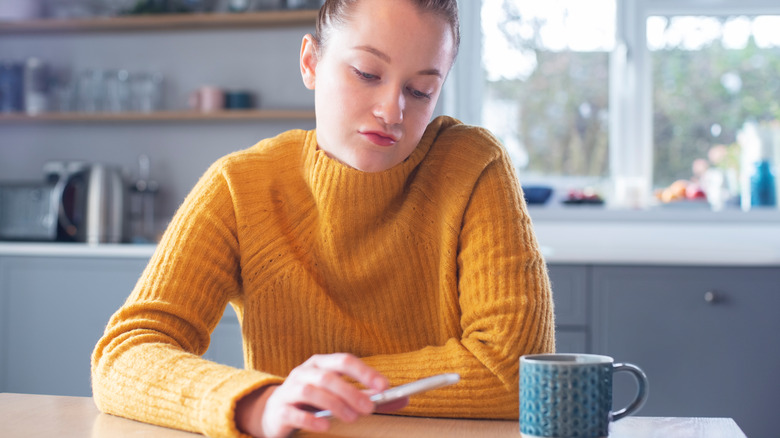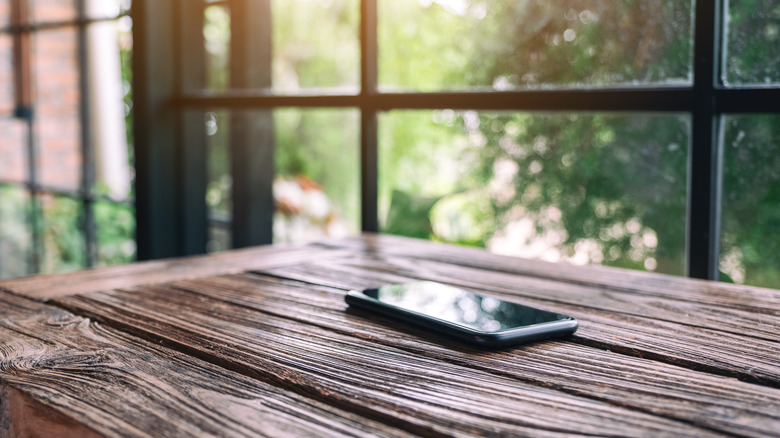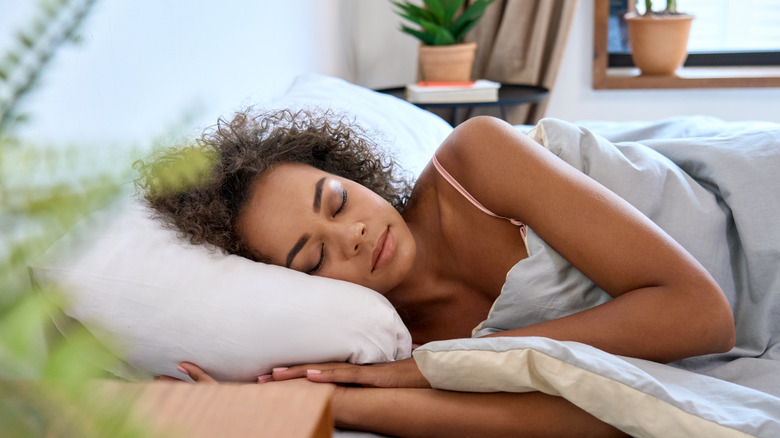5 Realistic Ways To Put Space Between You And Your Phone (Because We Know It's Hard)
Are phones taking over our lives? That depends, but the statistics are pretty intense. Nearly 40% of all phone users admit to using them too much, according to stats from SlickText. On top of that, most smartphone users will spend over five years of their lives on social media. That's a huge chunk of time! Plus, 66% of people actually feel fear when they're away from their phones, so it might be time to look at our relationship with these gadgets.
There's legitimate concern over phone addiction. While the term might sound intense, it's pretty accurate. Addiction Center calls it an "obsessive use of a smartphone" and there's rising concern about it. Healthcare professionals have even begun offering therapeutic support for phone use. But even if our relationships with our phones don't rise to the level of addiction, there still might be room to take some space from them. And there's good reason to consider it because excessive phone use can lead to anxiety, relationship issues, sleep problems, and depression.
There's actually a term for relationship neglect that comes from excessive phone use. It's called "phubbing," and it happens when someone snubs a person in front of them to concentrate on their phones. These are sobering realities. It's unrealistic to live without our phones as they've become indispensable. But there are ways to lessen the incessant impact of phones and break bad screen time habits.
1. Let people know
A lot of our stress and compulsion around our phones come from the nagging feeling that we need to be available to other people. It's a relatively modern concept that we're so accessible to everyone, and the pressure to respond can feel overwhelming. If you've been in the habit of responding to people promptly, this can make the concept of space between you and your phone even more daunting. How do you break that pattern?
It's simple. Tell people. Let friends and family know that you're trying to check your phone less. Say something like, "Hey, I'm trying not to look at my phone in the evenings, so if you don't hear from me then, you will the next day." That way, it'll alleviate any worry on their end, and eliminate your own anxiety about needing to be responsive. Dr. Carole Pemberton, a personal resilience expert, told The Guardian that letting people in on life-changing plans can be helpful. "You need to have supporters," says Pemberton. "People who will give you emotional support, but can also give you a shake and a loving boost if you're having wobbles."
The other win about this plan is that you might inspire others to do the same. Maybe it can become a group experience. The statistics show that phone usage is only going up. Asurion conducted a study and found that in 2019, people checked their phones 96 times a day. By 2022, the number went up to 352 times a day. Chances are that your friends or family might want to cut back as well.
2. Literally put your phone away
Part of the problem with our incessant phone checking is that our phones are often so close by. We keep them at our desks, in our pockets or bags, and carry them with us from room to room. A lot of our phone interactions happen unconsciously. So one effective thing to try is to literally create physical distance from our phones. If you have to get up or go to another room to look at your phone, the chances are you'll be less likely to check them as often. You'll have to engage with your phone more consciously to break the addiction.
In fact, consciousness is the whole point of creating a barrier between us and our mindless phone consumption. Kevin Roose wrote about his own phone problem for The New York Times. He admitted that during the process, he realized that he had a hard time with stillness, which is where a lot of phone use comes in. He described the process of changing his mental patterning around phone use, and said that he started practicing "doing nothing." The trick is to resist picking up the phone when you're bored, and it's a lot easier to resist when your phone isn't right within reach.
3. Let your phone help you leave it
There are ways your phones can make it possible for you to maintain some distance between. For starters, turn off as many push notifications as possible, so that you're not distracted both audibly and visually. Be selective. There might be certain apps you legitimately need to stay on top of, like email, so you can choose to allow those notifications. But others, like social media, may not be as pressing. Turning off all notifications from those apps allows you space to check the nonessentials when you have the time.
There's also the option of clearing out your home screen. More distracting apps can go into a folder on the last slide of your home screen to make it more challenging to open them. This way, you create a small buffer of space where you have to consciously make the effort to find the app and open it. This prevents the mindlessness of opening those familiar apps that bring comfort and distraction. Consider also using the grayscale option, which turns everything on your phone screen a drab, functional gray. To do this on iPhones, go to "Display Accommodations" and then tap "Color Filters."
Another tool that most phones offer is a focus mode, which allows you to limit distractions from your phone when you're working or sleeping. The goal is to limit interruptions. These are all small things, but worth considering so that we can let technology help us get some space from our phones.
4. A case for the phone-free bedroom
While it's up to each of us where and how we limit our phone use, there's pretty conclusive evidence that one room in our homes should be as phone-free as possible — the bedroom. For the sake of your sleep quality and intimacy, keeping phones out of your bedroom can be crucial. In Roose's New York Times article, he cited technology guide Catherine Price, who recommended being selective about where you charge your phone. Phone charging, Price said, should never happen in the bedroom. Price charges her phone in a closet. Roose charged his phone in a locked mini-safe.
But one major reason for keeping your phone out of your bedroom is the impact they have on your sleep quality. Electric light can alter circadian rhythms even more than caffeine does. This blue light reduces the ability to naturally create melatonin, which people need to sleep. Creating phone boundaries in your bedroom is the building block for a healthy schedule that's grounded in nights of restorative sleep. Try to be off of your phone at least 30 minutes before sleep, and keep it away from your bed if possible.
5. Replace your phone with something else you love
If you want to create the habit of increasing space from your phone, the best strategy is to replace the action with something else. As Roose was working to lessen his phone use, he said that he actively pursued other activities to keep himself busy. He took pottery lessons, read books, looked at the stars, and did crossword puzzles.
In order to truly succeed at the challenge of creating space from your phone, find ways that satisfy you while simultaneously filling the void. HuffPost offers a list of 30 ways to engage in life without phones. There's an array of activities that can fill your life with meaning and quality time. These ideas include spending time with your family and loved ones, immersing yourself in nature, and enhancing your creative skills like painting and writing. Think of fun things to do with your hands, like embroidery, crafts, and cooking to keep your mind immersed and engaged.
Of course, it's unrealistic for many people to go technologically rogue and throw their phones out the window. However, if you add up your screen time, the monthly or yearly totals can equal a shocking portion of your life. It might be time to limit that number and replace that time with meaningful, memorable experiences.





